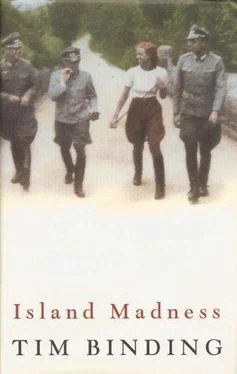“Yes?”
“You call it collaboration.”
“People called it a lot worse than that, Major.” He paused. “But if she was found in here surely that points to one of your men?”
Lentsch stared down at the floor. Captain Zepernick broke in.
“If she was killed by a soldier, do you think they would have left her here?” he said. “Do you not think they would have thrown her over the cliff, or taken her somewhere not so embarrassing?”
“But civilians would have to know of the escape shaft’s existence. This area has been out of bounds to us for over eighteen months. How do you explain that?”
Captain Zepernick shrugged his shoulders.
“What about the Todt workers,” Ned persisted, “the foreigns? We all know you can’t keep them under control.”
The Captain was growing impatient.
“It is not the Zwangsarbeiters or our men that should concern you. There is something else.”
He ducked out of the door and into the corridor. Ned hesitated. He did not want this. He had told Isobel the truth when they had first met. He had seen only one body and that an accidental death, not one silenced by malice.
“In here,” Zepernick announced. “The ammunition room.”
Ned followed him into a chamber running off to the right. Painted on the walls leapt a fresco of firs and ferns and glades of stolen light. Brown bears peeped out of clumps of trees, deer drank from ponds and through the branches flew woodpeckers and ducks.
“It is beautiful, is it not?” Lentsch spoke softly behind him. Ned turned, startled. “The men miss their homeland,” he explained, both proud and apologetic. “Go to any German barracks and you will find the same. It would not be so in England, I think. In Sandhurst or Aldershot.”
Along the walls, against the delicately drawn grasses, stood racks of artillery shells, stacked lengthways like a woodcutter’s supply of winter logs. In the middle of this military glade lay a figure: Isobel, gaily clad in a calf-length tunic of fringed green, palms down by her side. Her skin, where it was visible, her arms her legs, the still divide of her breasts, was blue. Her mouth was strangely open, as if frozen in a cry or expectant of a lover’s kiss. He bent down and saw the reason why. It was held open by a quantity of what looked like pale butter. A horrid thought came into his mind and his eyes travelled to where the outline of her hips could be seen, before questioning the Captain with a look.
“Just the mouth,” the Captain replied.
Ned looked closer. It had been squeezed in. He could see the indentations of a man’s knuckles.
“What is it?” Ned said, touching it gently. “Butter?”
“Cement,” Captain Zepernick said, embarrassed. “And much sand. In her nostrils also.”
Ned lifted her arm and placed it across her chest. It was the first time he had touched a dead person and though he trembled to touch her, not remembering her exactly, for there was no time for that, but recognizing the shape and stretch of her, he found it easier than he had imagined. She still felt like Isobel. Her skin was paler than Isobel’s, that was all. He put his hand gently on her belly. The cold seemed to radiate through the thin cloth. She looked frozen.
“It’s the wrong time of year to be out wearing something like this,” he said, fingering the strap of her dress, straightening it back over her shoulder.
“Peter Pan,” Lentsch said, standing behind him.
“What?”
“It is the tunic she wore when we first met,” the Major told him. “That is why she is wearing it.”
“She was destined for the Major’s party,” the Captain explained.
“What party?”
“For my return,” the Major said. “It was a surprise.”
Ned got to his feet. Suddenly from across the corridor a whirring noise started. The cuckoo clock sounded seven times. They stood still, arms behind their backs, heads bowed, as if the last post was sounding. As the echo died down Ned bent down again. There was a speek of something caught in the depths of her hair. He held it in the air.
“ Was halten Sie von diesem? ” he said. The others stopped. He could hear them holding their breath in surprise. The Captain took the strand from his grasp.
“From outside?” Zepernick suggested. “As they carried her up the cliffpath?”
It was Ned’s turn to shake his head.
“This isn’t grass,” he said. “This is straw. From a farm or a stable, perhaps. Had she been riding that day?” He looked at Lentsch.
“Not that I am aware of,” he said.
The three gunners who had found her, Kanoniers Rupp, Bauer, and Laurer, were country boys all, with country boy’s hands and country boy’s complexions. They had seen nothing, heard nothing. They had manned their gun like honest soldiers. That was all they understood, the rest was hopeful bewilderment. Unlike the officers their grasp of English was slight. They looked at their boots, watching each other out of the corner of their eyes for signs of betrayal. Clustering round the little table like young birds in a crowded nest, opening their mouths in an anxious chorus of demanding innocence, it was impossible to hear their story straight, and Ned was sure that that was what it was, a story, but even when sent out of the room and brought back one by one, standing before the two men who could banish them to the Russian front, they managed to maintain their faltering innocence. But there was a tale they were not telling, this fearful little group, something which had taken place within this cramped and claustrophobic room, with its folded blankets and polished boots. He could catch it in the inadvertent looks to the absent Lieutenant’s low bunk, as if they expected the black field phone on the wall near his pillow to spring into accusatory life; he could follow it by the uneasy order that informed their rest room, the stubby chess pieces sitting neatly in their squares, the uncluttered, half-used mantelpiece, the bare space under each set of bunks. All barrack rooms display a certain scrubbed solitude, Ned knew from his own experience, but there was a degree of latitude allowed in such quarters which had not been prevailed upon here. It had been sterilized, wiped clean. Something had gone on here, though Ned was sure it was nothing to do with Isobel. But their fear, their theatrical outrage at her intrusion, puzzled him. It was as if her presence threatened to shed an unwelcome light on some other activity. Perhaps the iron air filter doubled up as an illegal still. Perhaps they’d uncovered a coven of pederasts. Perhaps the missing Schade, lying in a drunken stupor in the Soldatenheim, could enlighten them.
Before driving to van Dielen’s house, Ned asked to be taken back home. He wanted to tell Mum the news before Albert arrived with it tucked under his arm. She hadn’t gone to bed. She was in the kitchen counting out the food stores, checking them off in the little pocketbook she kept in her apron. She did it every morning, and most afternoons too. She heard him come in but barely turned from the pantry door.
“Only an ounce of butter left,” she fretted. “And no more coming till next week. And that tea your uncle brought round. It’s half gone already. It’s too much, really it is.”
Ned led her out of the pantry door and standing by the porcelain sink told her as best he could. He hardly knew what to say. His mother had never met Isobel. She had never even talked about her. When he had been seeing her, he had been doing something that was not simply on his own but outside his mother’s understanding. They had seen his mother once, him and Isobel, walking up past Isobel’s house, taking Dad his tea when he was working overtime on some renovation work for the museum. She had been clothed as she was now, in an old shirt and a long faded blue skirt with sagging pockets at the front, her bare arms swinging her thick calico shopping bag, her large and ruddy face set to the task ahead. Her footsteps were solid, like her shoes, her strength harnessed to the necessity of work, so different from the demeanour of the young woman beside him. It was not simply a matter of age. The distinction between them would remain whatever their times in life, even if it were his mother who had been the girl and Isobel the older woman. Suddenly he had not wanted to belong to his mother or any of her kind. He wanted to lay claim only to Isobel and all the other Isobels of the world, young or old. He wanted to inherit their muscle, their skin, their light unsullied timbre. He stepped back behind a bush and pulled Isobel after him.
Читать дальше












